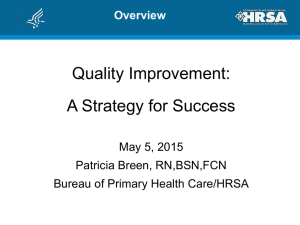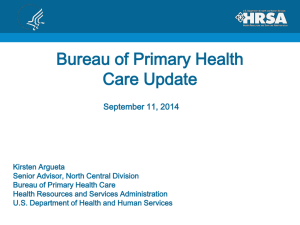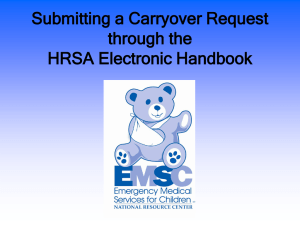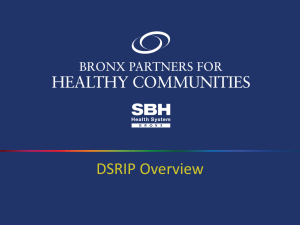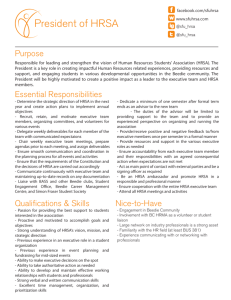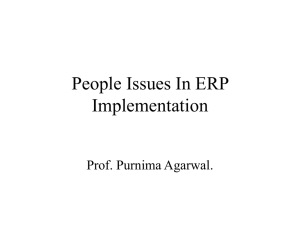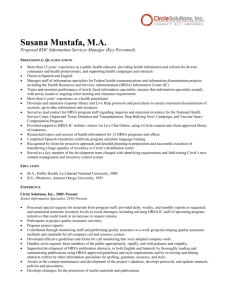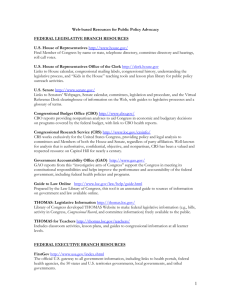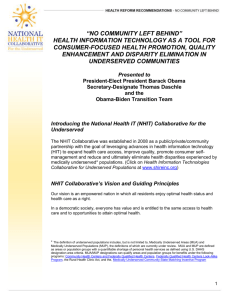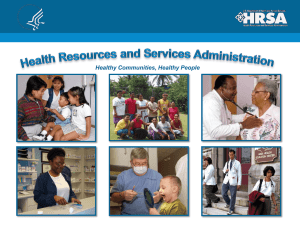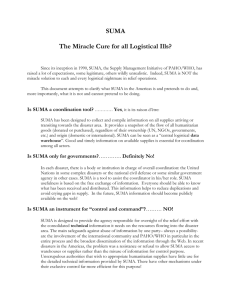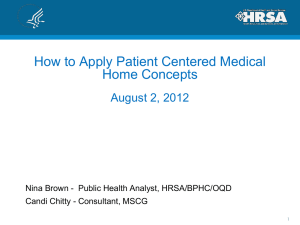Suma Nair - BPHC QI Strategy for AR PCA
advertisement
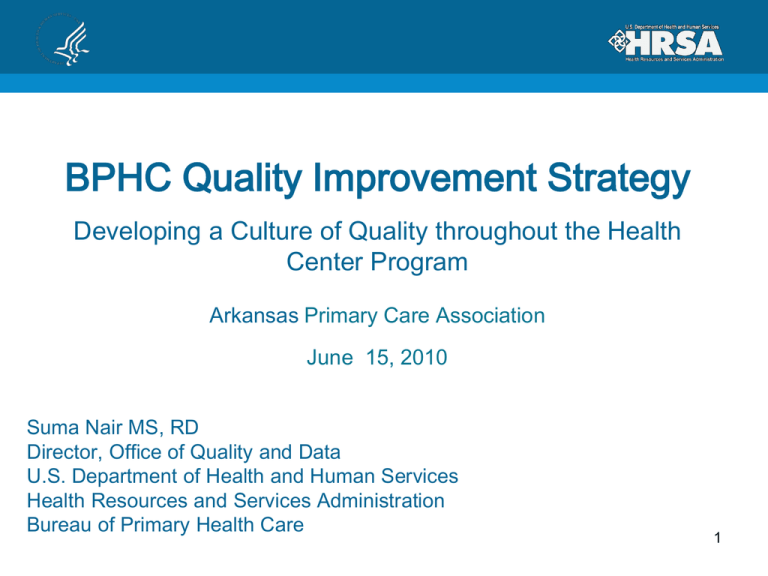
BPHC Quality Improvement Strategy Developing a Culture of Quality throughout the Health Center Program Arkansas Primary Care Association June 15, 2010 Suma Nair MS, RD Director, Office of Quality and Data U.S. Department of Health and Human Services Health Resources and Services Administration Bureau of Primary Health Care 1 Primary Health Care Mission Improve the health of the Nation’s underserved communities and vulnerable populations by assuring access to comprehensive, culturally competent, quality primary health care services 2 Primary Health Care Vision A national network of strong health centers providing quality care that improves the health of patients and communities 3 Health Center Requirements • Community Need: – Located in medically underserved areas (MUA) or serves medically underserved populations (MUP) • Services: – Provide comprehensive primary care services – Provide enabling services such as education, translation and transportation that promote access to health care – Services available to all with fees adjusted upon ability to pay • Management and Finance: – Meet performance and accountability requirements regarding administrative, clinical, and financial operations • Governance: – Governed by a community board composed of a majority (51%) of health center patients who represent the population served Quality Health Care Health care that is… …safe, effective, patient-centered, timely, efficient, and equitable. IOM. Crossing the Quality Chasm, 2001. 5 BPHC QI Strategy Framework Inputs/ Resources Outcome Activities Output Impact (HCs providing care that is...) HRSA Health Centers Develop TA & TA & QI Support QI Support Available & Infrastructure Coordinated Facilitate HIT HIT Adopted & Adoption & Used Integration Meaningfully HC Partners Health Centers Safe Transformed for QI Care & Services Coordinated Effective Efficient Patient- Strengthen Eval. Eval. & & Innovation Innovations Centered Infrastructure On-going Timely/ Facilitate Collaborations & Local & National Communication Partnerships Stakeholders & Collaboration Strengthened Other HHS & Fed. Agencies Regionally QI Efforts Aligned Locally & Nationally Accessible Equitable 6 Key Components Provide TA to Support QI • Training and Technical Assistance – BPHC TA website – Webinars/Conference Calls – Direct TA through National Cooperative Agreements and Partners • Policy Guidance – QI Template • Risk Management Support 7 Key Components Support HIT Adoption • EHR adoption through Health Center Controlled Networks and CIP (ARRA) • Work with Federal partners on meaningful use, Beacon Community, Regional Extension Centers. 8 Key Components Evaluation and Innovations • Assure quality through data – BPHC: UDS, HC Quarterly Reports, Patient Surveys, FTCA Claims, Site visits, Accreditation – Other sources: HAB, NCA – Public health & community data • Identify Best-Practices – Performance measurement and analysis – Case studies • Translational Research and Demonstrations – CHARN, PBRN – CMS FQHC APC Demonstration 9 Key Components Alignment and Integration through Partnerships • HRSA – MCHB: Title V, Text 4 Baby – HAB: Ryan White – ORHP: RHC and Critical Access Hospitals – BHPr: Health Professions Training – BCRS: National Health Services Corps. – Office of Health IT and Quality – Office of Special Health Affairs 10 Key Components Alignment and Integration through Partnerships • Federal Partners – HHS: CMS, CDC, SAMHSA, AHRQ, IHS, etc. – Federal wide: ONDCP, VA, HUD, DOE, USDA, etc. – States and local governments • Private Partners – Various stakeholder groups – Foundations • National Accreditation and Recognition 11 Packaging the Activities Patient-Centered Medical Homes/ Advanced Primary Care • Align with and influence national standards • Build on existing programs. • Provide incentives and TA to become PCMH • Support evaluations & innovations • Partner with key stakeholders 12 Packaging the Activities Work with HCCNs & PCAs to… • Support successful EHR adoption • Prepare HCs for meaningful use • Support participation in Health Information Exchanges • Support participation in Practice Based Research Networks • Utilize EHRs to facilitate quality improvement and risk management 13 Packaging the Activities Health Centers as Public Health Interventions • Adopt population health approaches – Support community needs assessment (e.g. Health Landscape, CHSI, Match, etc.) – Examine HC impact on community health and health systems as a whole – Partner with public health departments, services and organizations – Leverage clinical data to inform population health 14 Contact Information Suma Nair MS, RD Director, Office of Quality and Data Bureau of Primary Health Care Health Resources and Services Administration 301-594-0818 Suma.Nair@hrsa.hhs.gov 15
